29:40
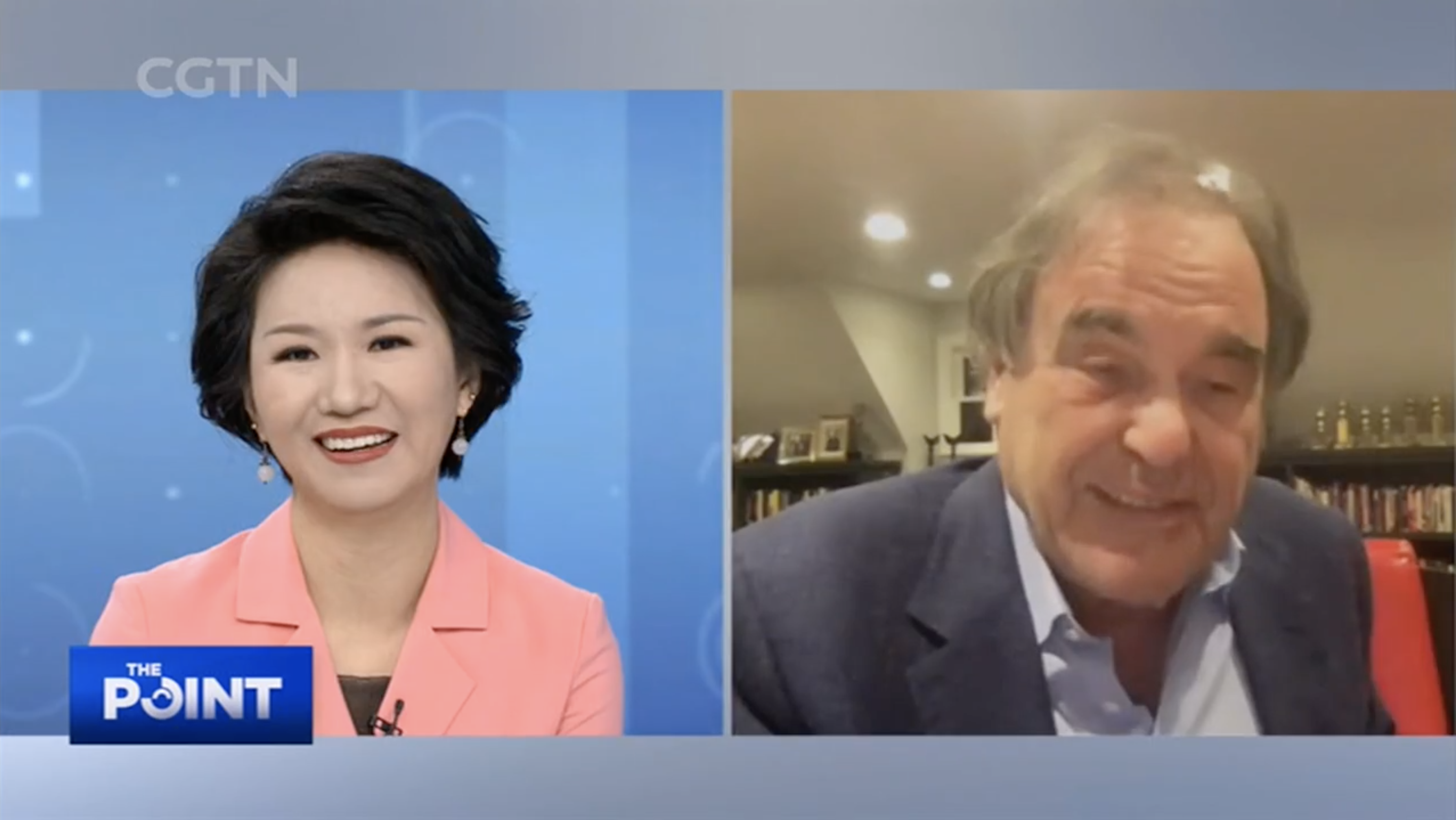
On Oct. 9 and 10, senior officials from the Taliban and the United States met for the first time since the U.S. military withdrawal from Afghanistan in August.
The two sides discussed containing extremist groups and easing the evacuation of foreign citizens and Afghans from the country. The U.S. delegation reiterated the Taliban will be judged by its actions and not its words. But who will judge the U.S.?
Liu Xin spoke to Oliver Stone, a 3-time academy award winning filmmaker, known for creating some of America's most iconic movies including the Vietnam war drama Platoon, JFK - a film about the assassination of John F. Kennedy, and the biographical thriller Snowden.
As well as being a revered filmmaker, Stone is also a veteran of the Vietnam War. Below is a transcript of the interview. The interview was conducted on October 13, 2021.
U.S. "overly concerned about communism" after WWII
Liu Xin: You fought in the Vietnam war at the age of 21. In an interview earlier this year you said, we went to war on a false basis.
Unfortunately, the same forces that made that war happen continued in our life, and they controlled us and pushed us into another war and another war and another war." What are these forces that keep pushing the U.S. into wars? Is it something inherent in the system?
Oliver Stone: You asked a key question. It has obviously concerned me my whole life because I grew up after World War II.
And I think after that war, United States changed remarkably. It became overly concerned about communism and made that a bug-a-boo and created a monster of energy, an enemy that was enormous, a worldwide conspiracy that was engulfing the world, led by Russia and communist China.
So, they said and, they were spreading communism like dominos all over the planet and that they would take over our own government. Now it may sound crazy to a person who's a modern person who read a lot.
But in those days, believe me, it was frightening. I was a young man; I was 10 years old or 9 years old. My father was scaring me. He was a soldier in World War II. He was telling me stories about what the Russians were doing in Washington D.C., spies, they were in our schools with their mentality.
Communism was a disease. You see, it was like COVID, and it could be caught. In other words, the United States, in a sense, was fighting against domestic reform, too, because the labor unions were associated with communists. And the teachers in the schools were associated with communism.
Joseph McCarthy who was a zealot of a senator associated any kind of internal questioning as communism. It became very dangerous for liberals, people who had more cosmopolitan outlook, for them to express themselves.
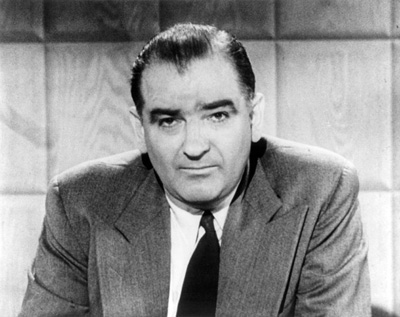
File photo of Joseph R. McCarthy/ Library of U.S. Congress
File photo of Joseph R. McCarthy/ Library of U.S. Congress
I know this from my father's life because he was in business and he had many friends who were of a liberal persuasion, but they were muzzled in this period. They were scared to talk.
"Fear of communism" created to counter unemployment
Liu Xin: So, what is it? The fear about communism or is it people's inherent fear about finding out about themselves, about their weaknesses, their limitations that drive the United States, or is a capital that are capitalizing on these?
Oliver Stone: There's all those factors, the concept psychologically that you're scared of what scares you, you're creating, what scares you is the enemy. And you attack the enemy and the enemy has to be defeated like a virus. And I think in a sense, it's something that's in us that is scared.
Secondly, and very importantly, as you say, the capital instruction. After World War II, there was a tremendous fear of unemployment. Again, coming back, we had a major depression in the 1930s in the United States, my father was a victim of it, as were many.
And there was a fear that after all the soldiers came home from abroad, the east and the west, there would be an excess of men who could not find employment.
And to create, to keep the war machine rolling, we found out in the five years of war that we made factories that were turning out aircraft and all kinds of munitions. We found that it created employment.
So, over a period of a few years, the republicans, as opposed to the democrats, really, said: let's create the fear of communism. Fear is what's going to keep this program of domestic spending going and that's what happened.
Change of mind after fighting in Vietnam war
Liu Xin: What got you out of this fear? Because the influence of a father on a young boy can be immense, but what liberated you?
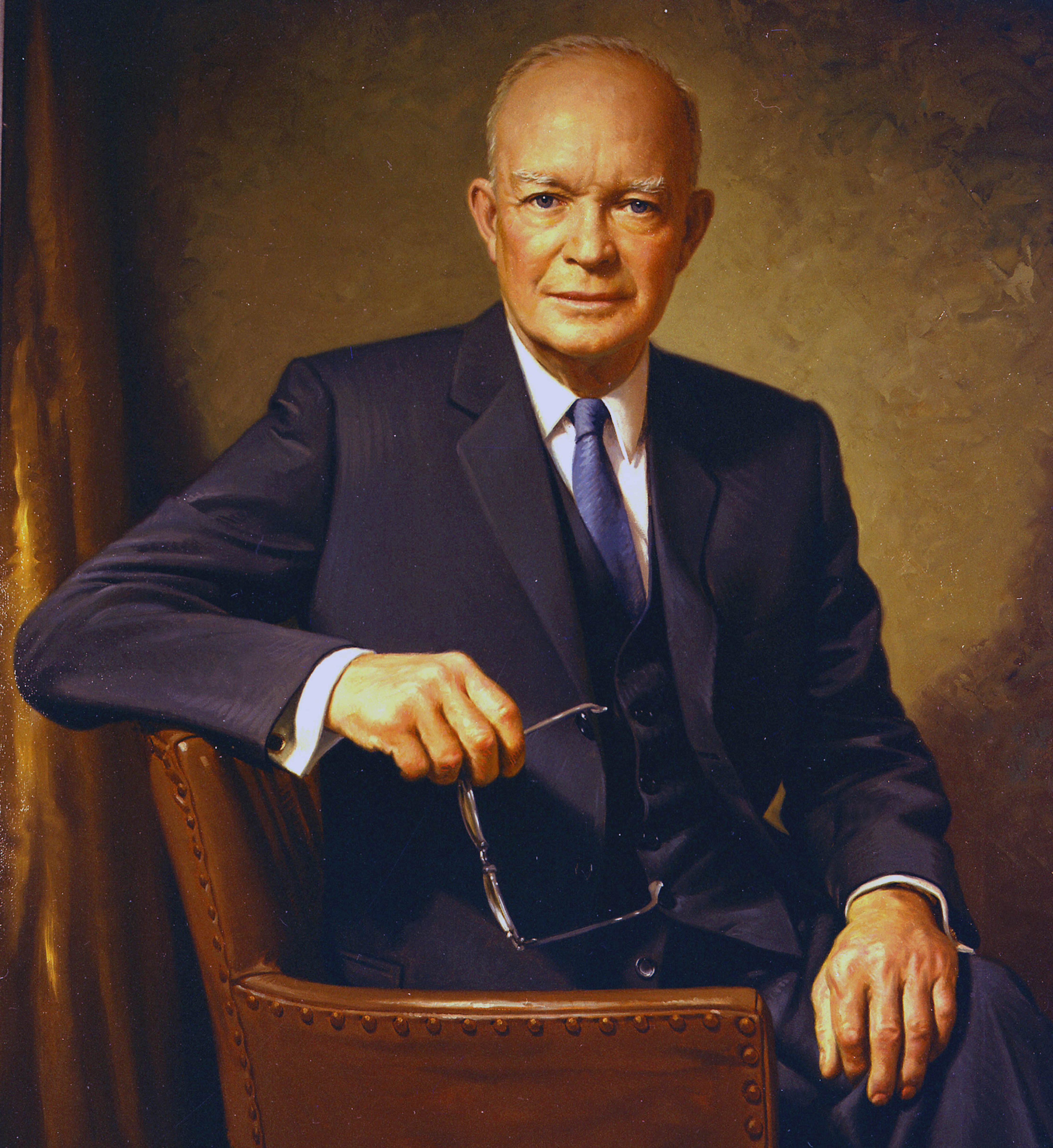
File photo: Dwight David Eisenhower, who served as Supreme Commander of the Allied Forces in Europe. /IC Photo
File photo: Dwight David Eisenhower, who served as Supreme Commander of the Allied Forces in Europe. /IC Photo
Oliver Stone: It took me years. The buildup occurred under Eisenhower essentially. The military industrial complex grew especially from 1952 to 1960 when he led office. And it never turned back since that time, never turned back. And that's very important to remember, it goes all the way through 2020.
So, from 1950 to 1953 during the Korean war, the United States really starts to ramp up into a military garrison, not only in garrison in the United States, but enormous amount of bases abroad.
We never gave up any of the bases from World War II. We stayed in Japan, we stayed in Germany, and of course, France and England. We stayed, we never left.
In my lifetime it's been very difficult because I grew up under the shadow of fear, I was conservative in the beginning of my life, very much so, I went to Vietnam under the impression of my father, of that sense that the Vietnamese were part of this conspiracy of communism to take over the world.
I went over there and I fought in front line unit, I volunteered for the infantry. I came back, I can't say I changed overnight, but I saw a tremendous amount of inconsistency, lack of reason, and cruelty.
And it affected me but I didn't do anything. It took a long time. Many other people were more conscious than I was, but I did go to school. I went back to college, to NYU, New York University. I studied film and I obviously was under the influence of people who I met.
I started to broaden my experience of the world, and by the time I was 30 years old, I'm starting to change, I had many fights with my father and so forth. I talk about it in my memoir that I wrote recently called Chasing the Light.
Fear of communism still looms over
Liu Xin: I'll be interested, because it is very interesting how many people are still being influenced by that kind fear about communism or under the influence of those theories.
Oliver Stone: It's across the country. I mean, you run across people in the United States who talk about the Russians like they are dogs or something. There's a lot of that. People in America, many people don't have passports. I guess a lot of ignorant countries where they assume that foreigners are dangerous.
And this is an old thing that goes back, it goes back to the fear of immigrants too, but certainly the fear of Russia was instilled. It's still there.
Now many people travel to Russia, know what the real story is, and I want them to have an open system, but it's very difficult once you start to spend the money on the military industrial complex that we have, to cut back.
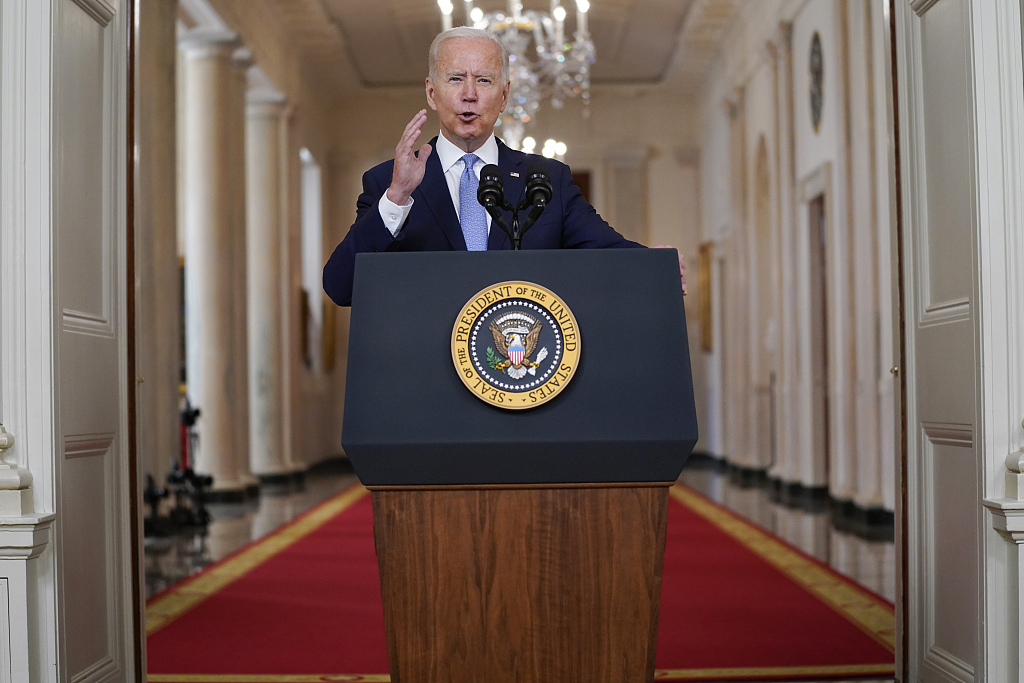
U.S.President Joe Biden speaks about the end of the Afghanistanwar in Washington D.C, U.S.,Aug. 31, 2021/ VCG
U.S.President Joe Biden speaks about the end of the Afghanistanwar in Washington D.C, U.S.,Aug. 31, 2021/ VCG
Liu Xin: What about China? How much understanding do people have about China compared to Russia?
Oliver Stone: About as much as Russia. What I was trying to say when you asked me the question is, even when Joe Biden, who I have to commend him for withdrawing from Afghanistan, even though he withdrew, they raised the defense budget more this year, they went to another number.
They call it 700 billion, 750 or something like that, but they raised more money. So, in other words, it doesn't stop. There's a system in place.
People know there are contracts, huge amount of spending and that's what they're interested in. So, in a sense, it has become our greed and people are getting very fat off it.
Ignorance towards U.S. foreign policy since WWII
Liu Xin: Are you frustrated about it? Because you produced a documentary series called the Untold History of the United States which was released in 2012, almost a decade ago, and it's a long series of all of the wars that the U.S. went in.
And it gives a rare insight into the period of American history from the end of World War II through the Cold War and later. How was the series received in America? Do you think American public is learning or is willing to learn the truth of the past, especially about these wars?
Oliver Stone: Every country has problems with their own history and a lot of people don't know their own history. The series was received well by progressives. That's to say many historians on the progressive side were quite moved by it.
It's a 12-hour series. It was on network cable. It's not to say it was public television, it's not on public television, it was on a network show for which you need a subscription.
It has a limited access and then later on we sold it to Warner Brothers and they did a DVD and there have been showings now on Netflix, we made it finally to Netflix, at least in the United States.
So, it has been seen and seen by a large group of people and I can't say it's been censored.
But there's no question that in this country where I live, if you have these kinds of educational histories, they don't make it onto general television, they don't make it to public television. They're just not buying it.
Liu Xin: What are the forces behind it? Is it people are not interested, or by human nature, they don't want to see these painful episodes of the past?
Oliver Stone: I think the attitude is, frankly, and I cut to the chase here. It's like with movies. They don't want too much controversy.
If you're saying something that is going to be arguable and discussed and fought over and raised passions, it's not good for television, what they want is a that they want.
They like excitement, but it has to be a certain kind of excitement, often related to violence, and sports for example, but not the history of the country where you're questioning it.
Now, some things change. Like with the recent Black Lives Matter, there has been much more discussion about racism in the United States, much more and that's commendable.
And they reexamined the roots of the Civil War and this is a beginning of change. And there are all kinds of people, young people coming up and begin to question.
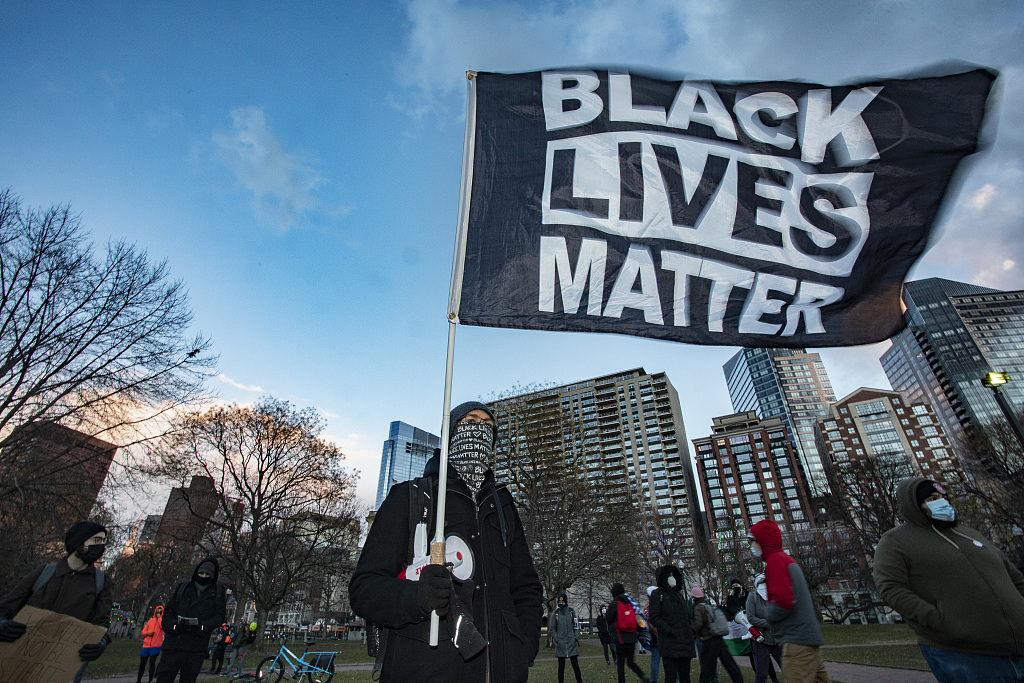
Protestor holds a "Black Lives Matter" sign in Boston, Massachusetts, U.S. January 20, 2021. / CFP
Protestor holds a "Black Lives Matter" sign in Boston, Massachusetts, U.S. January 20, 2021. / CFP
And hopefully, the more you learn, the more you want to know, which is what I feel. And one thing leads to the other.
But there is still so much ignorance and a lack of history, especially when it comes to communism and especially when it comes to the policies of the United States foreign policy since World War II.
Did U.S. learn from its mistakes in Afghanistan?
Liu Xin: You talk about history and the difficulty to look back, especially back to the past of yourself. What about what has been unfolding in front of people's eyes?
And I mean by the withdrawal in Afghanistan, it was played out on national television, international television, definitely very dramatic, very messy and tragic in many senses.
Do you think people have paid enough attention to this in the United States and the discussion had been deep enough, profound enough that they are at least learning something about what happened in this past 20 year?
Oliver Stone: It's hard to tell, Xin. The same thing happened when we pulled out of Vietnam in 1975. It fell in 75, we pulled out in 73. And the end of the Vietnamese army did the same thing with the Afghan army. They folded quickly and the political structure changed quickly.
But there was a lot of fingers pointing, recriminations. I'm sure there will be the same thing in Afghanistan, although it's a smaller war in terms of casualties. But the military tends to overlook these things and they blame the politicians.
They say, we could have won Vietnam, but it was badly handled from the beginning. We fought with one hand behind our backs. There are thousands of excuses, somewhat similar to what the Germans did after World War I. And they lived off their anger and discontent.
So, there was a tremendous amount of discontent in a split in this country after Vietnam, my film Platoon and Born in the 4th of July and then the third film I made about the Vietnamese which was Heaven and Earth, created an enormous amount of controversy and disturbance. I can't say it's resolved.
And the same thing is going to happen with Afghanistan. There will be those people who say we should have fought, we could have won and blah, blah, blah. And they'll be those people who say, what were we doing there in the first place?
The foreign intervention with our troops does not work. It has never worked, apparently. It didn't work back in the Mexican war and it doesn't work. We went to the Philippines in 1898, and they fought us to the teeth.
They fought us very they fought a long-extended guerrilla war and they were never happy with the United States occupation. The same thing is true in Korea and you asked about China. That was the first time I think the American people really woke up to China.
First of all, in 1949, when China came into existence and as a Communist republic, that was the end. I mean, the Americans went crazy over here. They thought that this was a completely screwed up by Franklin Roosevelt and then by the Democrats and Harry Truman and that he is responsible for this.
Although they could not accept that, there was an incompetent republic, there was an incompetent Chinese army, nationalist army that couldn't win anything because they were so corrupt. And they ended up in Taiwan.
So, what happened was, after we went to war quickly with the Koreans, which is another debacle, talk about a debacle. It never gets talked about; it's called the forgotten war. The Americans bombed Korea, unbelievably cruelly.
The Korean war "bloody, ridiculous, unnecessary"
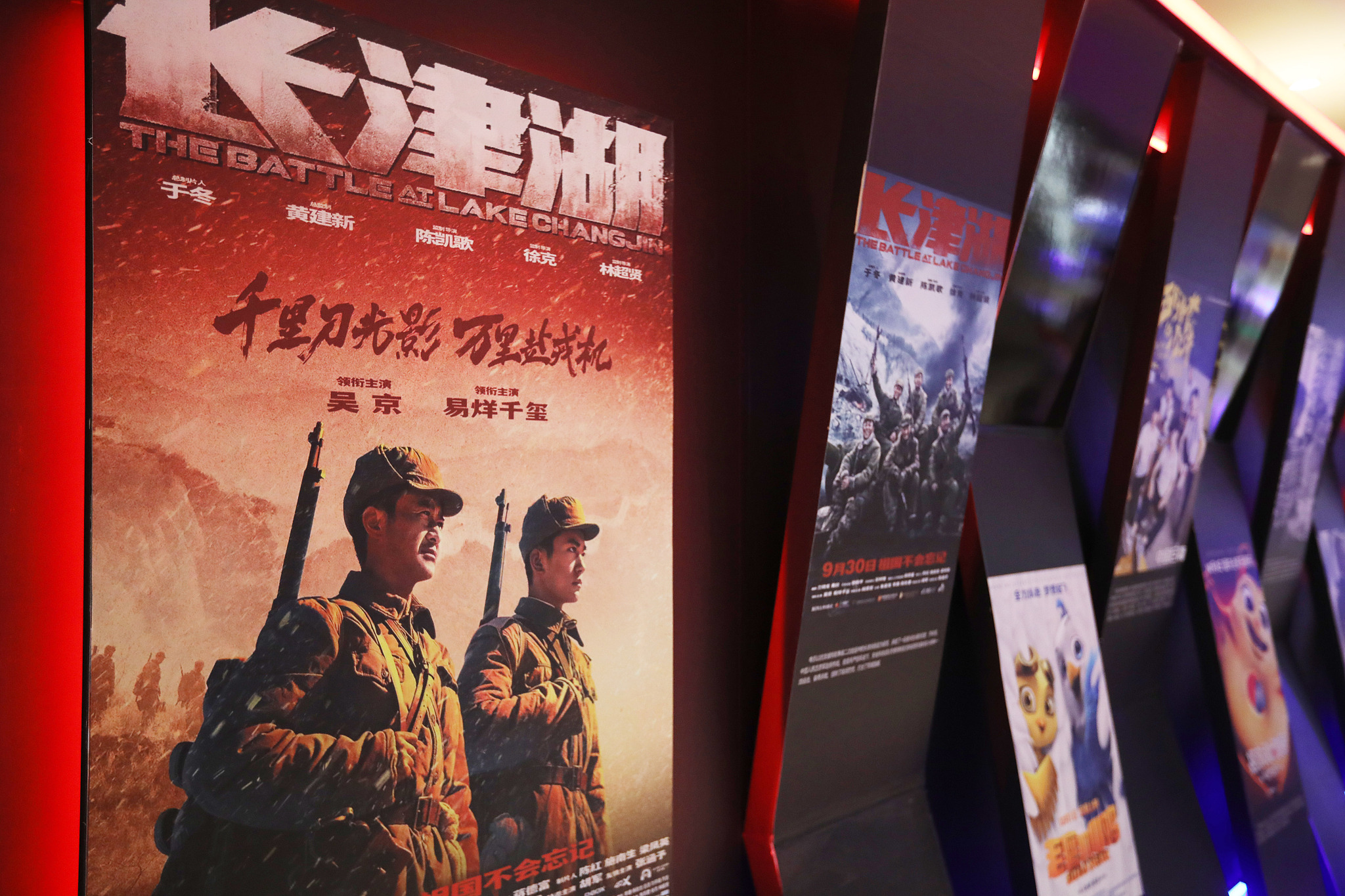
A poster of the Chinese historical film "The Battle at Lake Changjin" at a cinema in Beijing, October 1, 2021. /CFP
A poster of the Chinese historical film "The Battle at Lake Changjin" at a cinema in Beijing, October 1, 2021. /CFP
Liu Xin: Speaking of the Korean War, during these past few weeks, there has been much talk about this very hard-fought battle in the Changjin Lake. A Chinese movie was made about this, and history was dug out about what happened.
And American journalists were filming during that battle also, their footage is also coming out. Huge discussion. Have you heard about this? Have you really seen that, heard about this? What are your comments I would really be interested in finding out.
Oliver Stone: I'm fascinated by the Korean war. It's the forgotten war, because there wasn't that much media back then, and the American forces controlled the media much better than they were able to in Vietnam.
It was a bloody, ridiculous war and unnecessary, because essentially it came out of the fear of communism. We were told that Stalin, the Russians were behind the invasion of South Korea. We went in there thinking we were fighting communism.
And then when Douglas MacArthur, the general, moved up north, he was talking repeatedly about bombing China. He was talking about dropping nuclear bomb on China, atomic bomb, so that's when the Chinese started to move in and they came into the war in a big way.
And in that battle you're talking about, it was part of that winter of 1950, 1951 when the American forces retreated into the south again, and it was a bloody war.
The Chinese lost many men, at least in that campaign and the Americans were not prepared for this kind of warfare. And it ended up, as you know, in a stalemate, several years, two years, three years later.
And we didn't learn anything from it. It was just a fight against communism and in which we did the same thing we did in Vietnam, but even worse. We bombed the south and we bombed the north.
Talking about killing civilians. This was huge. So many civilians were killed. People know about the north, because we flattened it. But they don't know about the south. We also flattened a lot of areas in the south.
U.S. propaganda against China
Liu Xin: Let's fast forward to present day. President Joe Biden upon withdrawing from Afghanistan basically said the United States needs to stop the damage in Afghanistan to concentrate on major power competition.
And with that, he means China and there's this hype to talk about democracy or like-minded countries versus authoritarian regimes such as China.
Do you think the shadows of that kind of idea that have been haunting the United States and other parts of the world is still here with us?
Oliver Stone: For several years, the last seven, eight years it was Russia and certainly the last two years of Trump, it was China. China was always in the news that it was the bad guy and it's very childish what's going on, but the United States has control over its news and some often its news is propaganda.
So, we started to hear about the Chinese and Huawei was a bad guy. 5G was going to be taken over by the Chinese. This was again the same thing, the mind warfare of the 1950s where communism was going to take over.
Now it's 5G, I mean, obviously with China, the same thing with the labor system in Xinjiang.
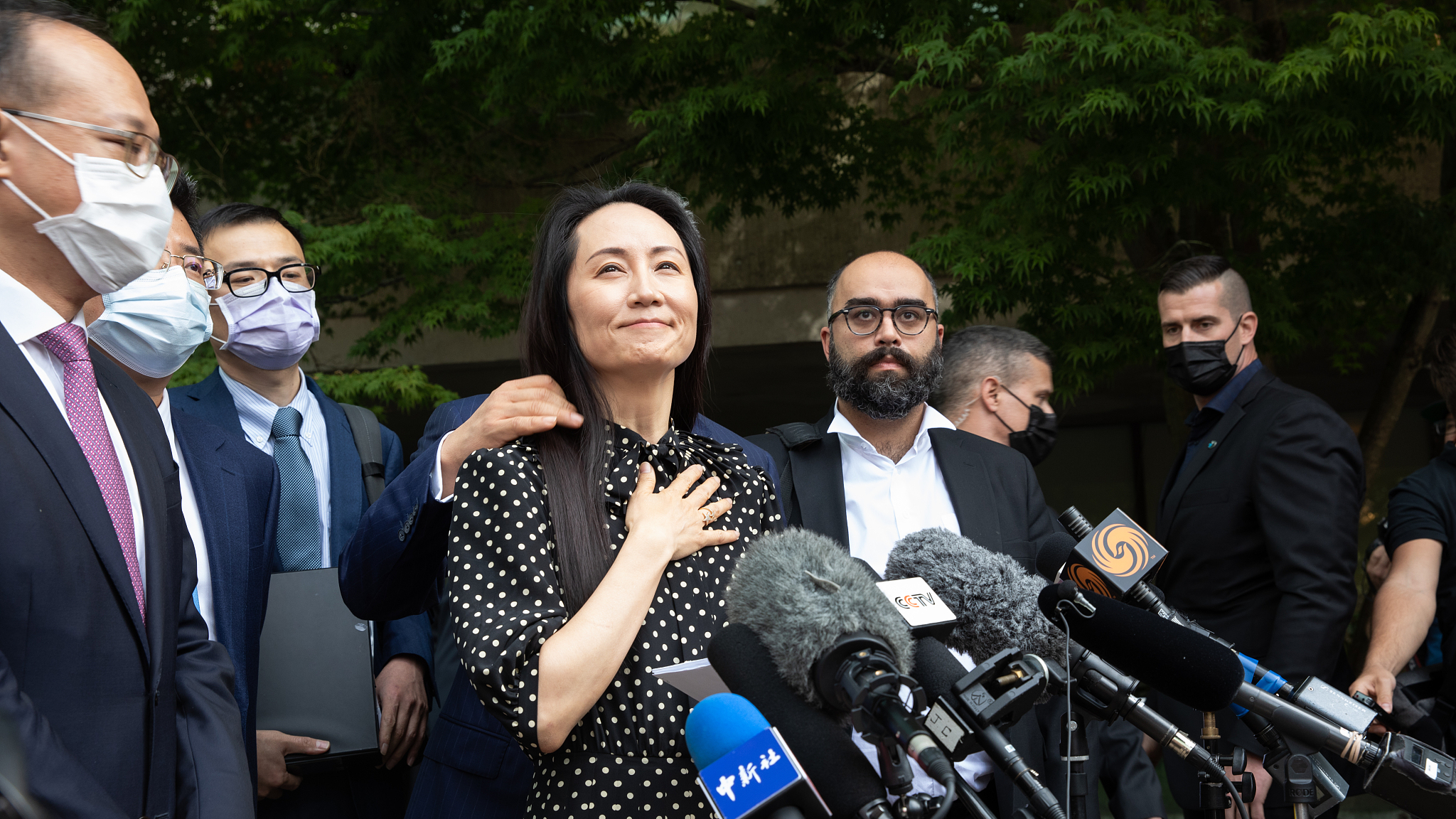
Meng Wanzhou, chief financial officer of Huawei, reads a statement outside B.C. Supreme Court in Vancouver, Canada, September 24, 2021. /VCG
Meng Wanzhou, chief financial officer of Huawei, reads a statement outside B.C. Supreme Court in Vancouver, Canada, September 24, 2021. /VCG
Liu Xin: Xinjiang.
Oliver Stone: They were making all these accusations about genocide which was insane because there was no proof of it. It was propaganda. They were selling, and the Christians too.
I mean everything that the United States can throw on the fire. You don't hear about it right now. You don't hear about it. Why?
Because the United States now has decided maybe hopefully, to calm down its Asia pivot. But they promised to send more troops to Asia. They've armed the Australians.
They're trying to arm the Vietnamese and so forth and the Filipinos. But I don't think they'll go for it. There's definitely a move back to the Pacific. Hillary Clinton talked about it. Obama talked about it. It was threatened, but we were always distracted by the Middle East.
And now there's talk about it, and the people the United States are subjected again to propaganda and who knows what's going to happen. We all pray it doesn't turn to another war game.
"Natural partnership" between China, U.S. on climate
Liu Xin: You said America must change its point of view from seeking to still be the only power in the world that is in control of the world. And you called it a suicidal path.
Do you think it is still very much on that course? Can it veer from that course? We have to take it away from that or however you call it, but this must not be the case.
Oliver Stone: I've been working on a documentary now for two years almost, on clean energy. I'm a firm believer in nuclear power, it's one of the main, we need nuclear power as well as renewable to bridge the gap with what's coming.
We need more and more electricity around the world. It's not just the United States and the West. It's China. It's India. It's all these countries. It's in Africa. There's going to be such a demand for electricity.
This is a time when we really have to think and be aware and conscious for this planet.
And I think there's a natural partnership between the United States and China, and I've said this for several years now, to create clean energy, as well as with Russia, which has done a lot of good work with nuclear.
So has China, China has done a lot of good work with nuclear energy, and also with solar panels and wind turbines, but China still uses far too much coal, as we know. And we have to get rid of coal, we have to get rid of gas and oil.
Without it, we're going to die anyway. So, it doesn't matter if we blow ourselves up. And I think a lot of the younger people know this, they sense it, that nuclear war is not the issue anymore. It is climate change. And China can be our partner.
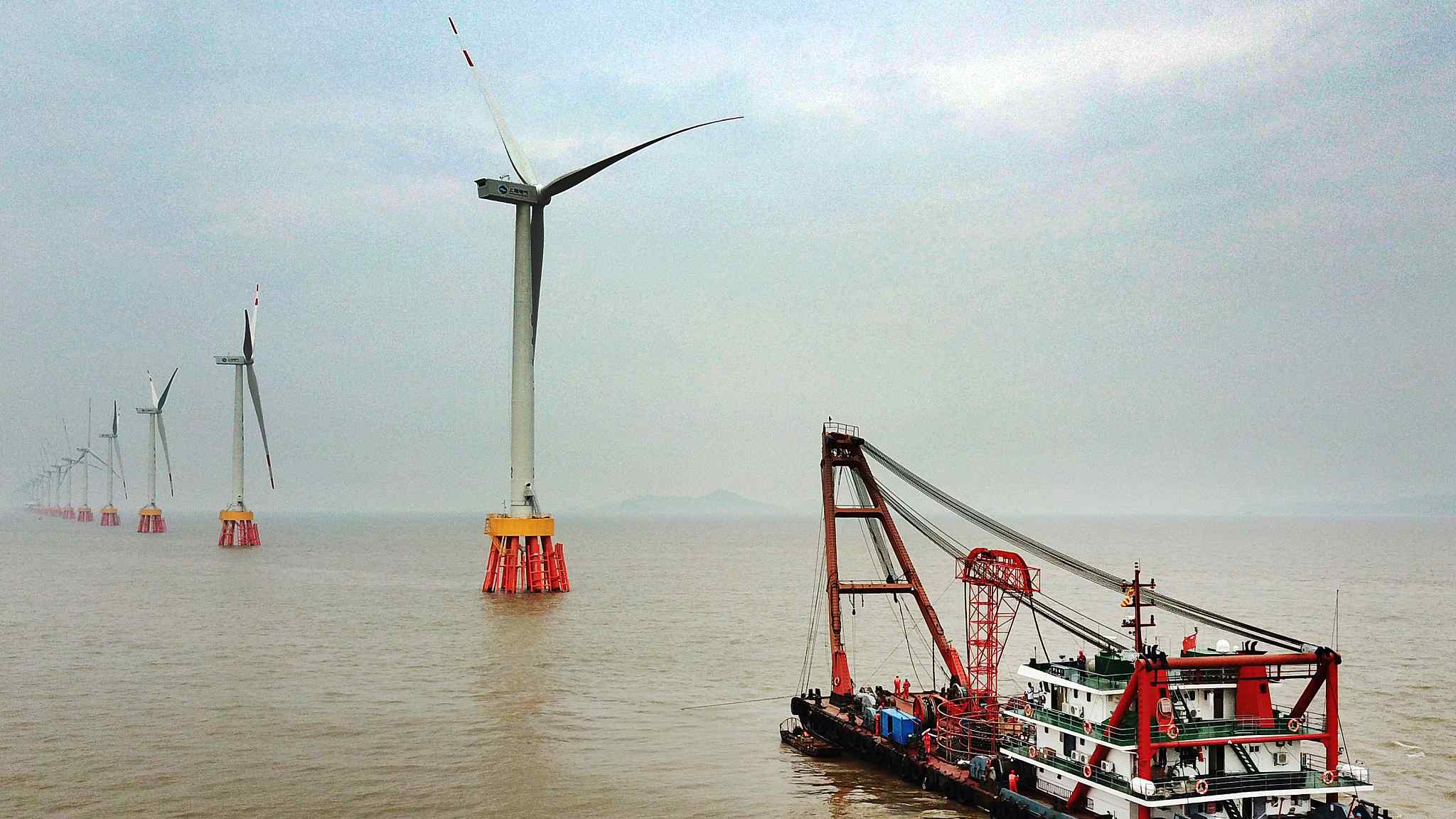
Guodian Zhoushan Putuo No. 6 Offshore Wind Farm in Zhoushan City, east China's Zhejiang Province, June 5, 2018. /CFP
Guodian Zhoushan Putuo No. 6 Offshore Wind Farm in Zhoushan City, east China's Zhejiang Province, June 5, 2018. /CFP
Liu Xin: Sure. And there are some encouraging signs. John Kerry, who's special envoy, initially on climate change cooperation with China, but actually has sent very strong messages about corporation, whether only in climate change.
And there have been some talk of, for instance, re-coupling between the United States economy and China by the Trade Representative Katherine Tai. Are these developments encouraging to you and the talk of upcoming presidential summit, virtually albeit?
Oliver Stone: Yes, we hope so. And as I said before, the talk about Huawei and Xinjiang has calm down. Hopefully it will not come back. But there are a lot of people in the United States, still hardcore people that are working against any kind of rapprochement with China or Russia.
They are at it, night and day and there's all these think tanks, lobbyists. It's a strange thing to be living in the country where so much falsification is going on. I live here in this world and I'm a movie maker.
I'd like to see the movie business a little bit more liberal in terms of not showing, not creating situations where China or Russia are the bad guy in these movies, it doesn't work for me.
Enhancing communication of China
Liu Xin: If I were to ask you something about a piece of advice on how to enhance, how to improve international communication of China, what would it be?
Oliver Stone: First of all, I think trade and economic liberalization is always the key to peace. The more people trade and get to know each other and travel, the better we all are. When we live in our isolation and societies, it becomes dangerous.
So, I think trade, making money, although there's an ugly side to this, but that's very important that these countries prosper, but they can prosper using clean energy.
This is a very important lesson for us.
We don't have to exploit the universe. We don't have to destroy our land trying to make money. What we have to do is we refocus our energy on creating, getting rid of gas and oil.
And if we can do that, that would be the biggest thing we can do for the world. The biggest thing we could do for the world, we can really change things. And I think so many more jobs could be created.
I applaud China for its advanced nuclear energy work, as well as Russia. The United States is also doing advanced nuclear, but not as broadly as these two countries.
Controversy around nuclear power safety
Liu Xin: But speaking of nuclear power, there has been a campaign against it because of the difficulty to get rid of nuclear waste, and the kind of risks you might have concerning nuclear power. Really briefly, what do you say to that?
Oliver Stone: You know who originally paid for that is the oil and gas companies. Oil and gas companies are invested heavily back in the 1950s. The United States when they started to develop, we were on our way to developing nuclear power.
We would have it now, we would have it all over the world, if it had been allowed to develop freely, but there was a concerted campaign with money in propaganda to scare people about waste and radiation, none of which is realistic.
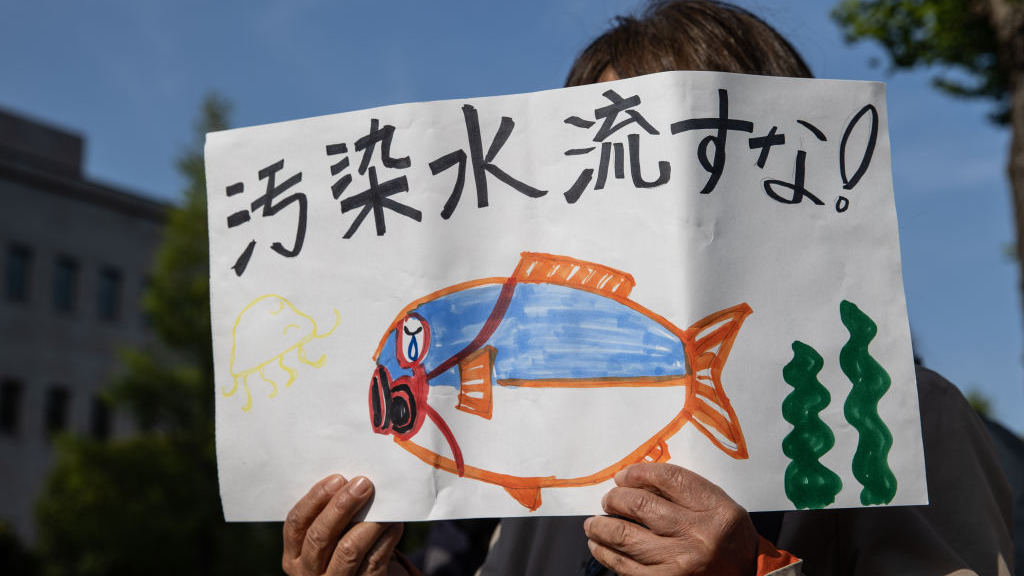
A woman holds a placard during a demonstration outside of Japanese prime minister's official residence on the decision to dispose radiation-contaminated water accumulated at the property of Fukushima Daiichi Nuclear Power Plant complex, in Tokyo, Japan, April 12, 2021. /Getty
A woman holds a placard during a demonstration outside of Japanese prime minister's official residence on the decision to dispose radiation-contaminated water accumulated at the property of Fukushima Daiichi Nuclear Power Plant complex, in Tokyo, Japan, April 12, 2021. /Getty
Liu Xin: But if you look at Fukushima, what happened there, it was a real accident.
Oliver Stone: Yes, it was a real accident, so was Chernobyl. In Fukushima, let me remind you there was a tsunami. That's what killed the people.
Zero people died from nuclear there. Nobody died from radiation poisoning. It was badly built on a site. It was not well done for whatever reasons.
Liu Xin: But the radiation did go on for decade, and it's still haunting the health of ...
Oliver Stone: That's fear, that's fear and the oil and gas companies use that they keep putting it up.
And also, the environmental movement fell for that, but a lot of environmentalists are waking up when you really get into the research, which is what we tried to do in this movie is, you will understand that there is nothing to fear for from that nuclear energy.
It's way safer per capita deaths than any other form of industrialization. Any other form. You know, the only casualties that happened were Chernobyl. And we know why and that was back in 1986, much has changed since then. The technology is so much better.

